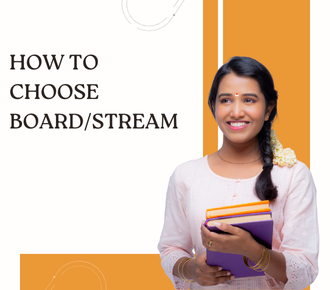- 9:30am - 6:30pm, Mon - Sun
- +91 7836034313
- R2-149 first floor M3M Cosmopolitan, sector 66 Gurugram 122102

One of the most important academic decisions parents and students face is how to choose board/stream after completing primary or middle school. Whether it is CBSE, ICSE, IB, Cambridge, or State Boards, each comes with its own strengths and challenges. Similarly, after Class 10, students must pick a stream—Science, Commerce, or Humanities—that aligns with their career aspirations.
This blog is a comprehensive parent guide that simplifies the process of making this decision. Using the primary keyword choose board stream and secondary keywords parent guide boards tips, parent guide boards notes, and parent guide boards syllabus, we will cover:
Why choosing the right board and stream matters
Board-wise syllabus and exam patterns
Stream options and career pathways
Actionable parent tips to guide children
PYQs (commonly asked decision questions)
Mistakes to avoid in selection
A free downloadable checklist to finalize the choice
We will also share useful internal resources to make learning easier:
Academic Foundation
The board defines the syllabus depth and approach to learning.
Future Competitive Exams
Streams influence preparation for JEE, NEET, UPSC, CA, CLAT, and other exams.
International Opportunities
IB and Cambridge are globally recognized.
Career Pathway
Choosing Science, Commerce, or Humanities early impacts higher studies.
Here’s a parent guide boards notes on different education boards in India:
Widely recognized in India.
Focus on Science and Math.
Objective-type exam patterns.
Best suited for JEE/NEET aspirants.
Balanced focus on language, science, and arts.
Emphasis on analytical skills.
Useful for all-round development.
Global recognition.
Activity and project-based learning.
Best for students planning to study abroad.
Flexible subject choices.
International curriculum.
Prepares for higher education abroad.
Regional syllabus with a focus on local context.
Easier compared to CBSE/ICSE.
Useful for state-level entrance exams.
Here is a structured parent guide boards syllabus comparison:
| Board | Focus Area | Strengths | Weaknesses |
|---|---|---|---|
| CBSE | Science & Math | National level exams | Limited arts focus |
| ICSE | Languages & Arts | Balanced curriculum | Heavy syllabus |
| IB | Projects & Global Skills | International recognition | Expensive fees |
| Cambridge | Subject Flexibility | Customizable learning | May not align with JEE/NEET |
| State | Local curriculum | Regional relevance | Not globally recognized |
Once the board is chosen, the next step is to choose the stream:
Subjects: Physics, Chemistry, Math/Biology, English.
Careers: Engineering, Medical, Research, Technology.
Subjects: Accounts, Business Studies, Economics, Math/English.
Careers: CA, CS, MBA, Banking, Finance.
Subjects: History, Geography, Political Science, Psychology, Sociology.
Careers: UPSC, Journalism, Law, Teaching, Design.
Here are actionable parent guide boards tips:
Assess Your Child’s Strengths – Check aptitude in science, math, or arts.
Consider Career Goals – Does your child aim for engineering, medicine, commerce, or humanities?
Evaluate Workload – ICSE is content-heavy, while CBSE is exam-oriented.
Think Long-Term – IB and Cambridge suit global education aspirations.
Financial Factor – International boards are costlier.
Should my child switch boards after Class 8 or 10?
Is CBSE better for competitive exams like NEET and JEE?
Does ICSE help in building strong English?
What if my child is undecided about career options?
Can a student shift from Commerce to Science later?
Which board is better for studying abroad?
Following Peer Pressure – Do not select a board because relatives recommend it.
Ignoring Child’s Interests – A mismatch leads to stress.
Choosing Only on School Reputation – The board and stream matter more than the building.
Neglecting Future Exams – Pick a board/stream aligned with higher studies.
Last-Minute Decisions – Research early to avoid rushed choices.
Here are simplified parent guide boards notes:
CBSE = Best for Science and national exams.
ICSE = Best for language and holistic development.
IB/IGCSE = Best for global education.
State = Best for regional context.
Science = For JEE/NEET/Medical.
Commerce = For Finance/Business.
Humanities = For Arts/UPSC/Law.
Research boards/streams by Class 8 or 9.
Attend career counseling sessions.
Discuss with subject teachers.
Take aptitude tests.
Create a 3–6 month roadmap before final choice.
✅ Downloadable Parent Checklist:
Identify child’s strengths through aptitude tests.
Match board syllabus with career goals.
Compare CBSE, ICSE, IB, Cambridge, State board.
Decide stream: Science, Commerce, or Humanities.
Avoid peer pressure or last-minute changes.
Align choice with budget and location.
Take expert counseling if needed.
A good tutor helps with:
Explaining board differences
Assessing a child’s aptitude
Providing stream-specific notes and guidance
Preparing for school exams and future entrances
Check out these useful resources:
Choosing the right board and stream is not just an academic decision—it shapes a child’s career, confidence, and future opportunities. Parents should carefully evaluate boards, syllabus, and streams before finalizing. With structured notes, actionable tips, and expert tutors, this process becomes simpler and stress-free.
By following the parent guide boards tips, revising the syllabus comparison, practicing PYQs, avoiding mistakes, and using our checklist, parents can confidently help their children step into the right academic path.








